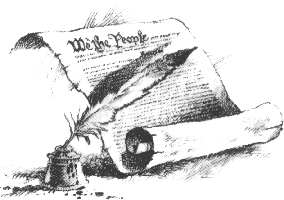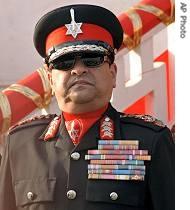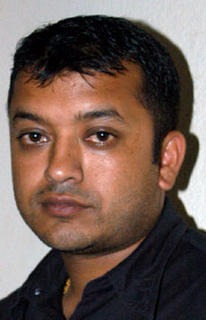
Proposed Constitution
Preamble
- Nepal is a federal republic, a total, transparent democracy, with the sovereignty resting with the Nepali people.
- There is to be a lower house, the Pratinidhi Sabha, with 180 members, 60 per state, and a upper house, the Rajya Sabha, with 60 members, 20 per state, all of whom are to be directly elected through constituencies demarcated such that the largest has a population not more than 5% of the smallest, geographically in close approximation to a circle or a square, and protected from partisan gerrymandering by an autonomous Election Commission. The constituencies need not respect district boundaries. Three constituencies for the Pratinidhi Sabha will make one for the Rajya Sabha. The entire Sabha is dissolved en masse when its term nears expiration.
- All matters of national importance are to be decided by the national parliament through a majority vote unless otherwise stated. Parliamentary procedures are to be laid out or revised with a 60% vote margin.
- The legislatures are to elect their Speakers and Deputy Speakers. The legislatures shall assemble at least once every four months, and as often as necessary.
- No parliamentarian may be arrested while the parliament might be in session except for felony charges. Their speech in parliament is protected from any and all oversight, legal and otherwise.
- A simple majority of the parliament will pass the budget. All budget proposals must originate in the Pratinidhi Sabha.
- All bills must be posted online in three languages - Nepali, Hindi and English - for at least one week before they may be voted upon.
- All regional and international treaties that Nepal might enter into will have to pass a 60% majority in the parliament.
- Political parties may not engage in fund-raising activities. Instead each national party, described as those that garnered at least 5% of the votes in the previous nationwide elections, will get an annual sum that will be directly proportional to the number of votes it earned. That money is to be used for party-building and electioneering activities. Details of expenses are to be posted online in the three languages to the last paisa on at least an annual basis.
- The Election Commission holds secret ballot elections for party leadership for each national party. Tickets for all elections are distributed by parties through democratic methods involving members at or below the said level in the organization.
- The Election Commission puts in place ceilings as to election expenditures. Independent candidates may not raise money, but may spend their own money that may not exceed the amount of the party candidate spending the most money. Once elected independent candidates may not join a national party for at least one year.
- A party may not charge its members more than Rs 36 a year.
- Every person on the state's payroll - elected officials, bureaucrats, justices, police, army personnel - is to submit a Family Property Statement, to be posted online and archived and updated annually. Upon exiting the public sector, they may discontinue the practice, but the archives will remain, and the updates will resume should the individuals re-enter public service.
- Details of all expenses incurred by the state, to the last paisa, are to be posted online in the three languages. All contracts offered by the state to the private sector are to be bid for in a similar transparent manner from beginning to the end. All job applications and promotions in the public sector are to be similarly handled in a transparent manner.
- All formal political deliberations at all levels of government are to be posted online in as real time as possible in the language that was used at the venue. Efforts are to be made to make the same available in Nepali, Hindi and English. All votes are to be similarly made public.
- Every elected official at all levels of government is to get a decent monthly salary.
- Anyone above the age of 16 is a legible voter. Members of the Pratinidhi Sabha will have to be at least 23 years of age, and that of the Rajya Sabha at least 25 years of age. The terms of members of the two bodies shall last four and six years respectively. All elected officials are to have been citizens.
- Acts of impeachment require a vote of 65%. This constitution can be amended by the same vote margin.
- The parliamentarians may not increase their salaries in a way that might affect the members of the existing class. The same applies to the salaries of members of the cabinet.
- The legislative party leader of the majority party in the Pratinidhi Sabha becomes Prime Minister. The Prime Minister may elect members to the Cabinet that might or might not be members of the parliament.
- When a majority might be lacking, the largest pre-poll alliance, or the largest single party, whichever might be larger, gets invited to form the government, and is given 30 days to prove majority.
- The Prime Minister makes nominations to the Supreme Court and other constitutional bodies like the Election Commission (EC) and the Commission to Control Corruption (CCC) to be confirmed by a 60% vote in the parliament. The commissioners serve 6-year terms.
- The army, to be called the Nepal Army, is not to be larger than 0.1% of the national population and is to be downsized accordingly within 5 years of this constitution getting promulgated. The Prime Minister is the Commander-In-Chief of the army.
- The central bank is to be autonomous, and the governor, to serve a six-year term, is to be appointed by the Prime Minister, subject to a 60% vote in the parliament.
- All appointments made by the Prime Minster, except for his or her personal staff, will need a majority vote in the parliament for confirmation, unless otherwise stated.
- The judiciary will reflect the composition of the government, from village/town to district, to state to the national level. Towns and cities with more than 25,000 people will be served with more than one court, the number to be decided through a formula by the state government. There will be a layer between the district and the state levels, the Appeals Court, 10 per state. The system is to be peopled like the civil service, on merit.
- The Prime Minister makes nominations to the national Supreme Court. The Chief Minister makes nominations to the State Supreme Court. Both are subject to their respective parliaments for 60% of the vote. Justices to the Supreme Court are to serve to the age of 75 or upto their voluntary retirement.
- The state and national Supreme Courts interpret the constitutionality of laws passed by the parliaments when thus challenged, but such interpretations may be overturned by the parliaments through a 65% vote.
- The parliament, federal or state, may not diminish the salary of a sitting judge.
- The current "zones" and "development regions" are to be abolished, but the "districts" are to be retained. The country is to be divided into three states, roughly of equal population, Eastern, Central, and Western, to be called Purbanchal, Madhyamanchal, and Paschimanchal, that are to include all three geographical regions, Terai, Pahad and Himal. Each state is to have a Pratinidhi Sabha, 120 members, and a Rajya Sabha, 40 members.
- The districts will have their own governments, forming a third layer, named Zillapalika. It is for each state to design the formation and functioning of its component district and town/city governments. The village units are to be called Grampalika, the town units are to be called Nagarpalika, and the city units Mahanagarpalika, and will form the fourth layer of government. District, town/city and village elected officials are to be at least 21 years of age.
- The federal government will directly transfer 10% of its annual budget to the 25 poorest districts measured by per capita income. This does not prevent further federal expenditures on those districts.
- The income tax structure is to be as follows: 50% federal, 30% state, 10% district, and 10% village/town/city. The income tax is to be collected by the federal government, and funds transferred by the same to the other levels of government as per this formula.
- The education system shall follow a tri-lingual policy up to Class 10, beyond which it is for each individual institution to decide on their own as to the language of instruction. The first language is to be the student's first language, the second language is to be Nepali. For those for whom Nepali might be their first language, the student may choose any language spoken in Nepal. The third language is to be English, the contemporary language of science and commerce. This policy applies to schools in both the private and the public sectors. The language of instruction for all other subjects to Class 10 will be a decision to be made by the individual school boards for the public schools and by the owners of the private schools.
- Every elected official in the country is to vote for a President who is to serve a five-year term and is to be the guardian of the constitution. A block of at least 30% of the national parliament may make nominations for the candidacy. When there are more than two candidates, the one who gets the most votes wins.
- Each state is to similarly elect a Governor.
- The parliament may not diminish the salary of a sitting president or governor.
- The individual is the most important component of the state and is to be protected and celebrated.
- Every person has a birth right to freedom of speech, freedom of peaceful assembly, freedom of religion, a right to a speedy, public trial, and a right to privacy, a protection from unreasonable searches and seizures. No person may be tried and punished for the same crime twice. No person will be compelled to testify against themselves. No person will be deprived of life, liberty or propety without due process of law. Private property may not be taken for public use without due compensation. Excessive bail shall not be required, nor excessive fines imposed, nor cruel and unusual punishments inflicted. The privilege of the Writ of Habeas Corpus shall not be suspended. No ex post facto law shall be passed. No warrants are to be issued, except upon probable cause, and should specifically describe the place to be searched, and the persons or things to be seized. A person charged with a crime is to have compulsory process for obtaining witnesses in his or her favor, and is to have the Assistance of Counsel for his or her defence.
- Every person born in Nepal is a citizen of Nepal. But this does not prevent people not born in Nepal from seeking Nepali citizenship.
- Every person is equal under the law. Any law that might conflict with that fundamental premise will become null and void as soon as this constitution takes effect.
- No person shall be taxed more than 40% of their income by all levels of government put together. Those in the bottom 40% income brackets are not to pay any direct taxes.
- No business may be taxed more than 30% of its income, and businesses in the bottom 30% income brackets will not pay any taxes. All business expenses are tax write-offs.
- The sales tax may not exceed 10% and is to be collected by the state.
- Elections at all levels are to be organized on Saturdays.
- No citizen of age may be barred from voting for whatever reason.
- It is a stated goal of the state to make possible lifelong education for every person in the country through creative partnerships between the private and public sectors, and through creative uses of the internet. The state shall also attempt to provide universal access to secondary education and primary health care, free of cost. The secondary education provision applies to people in all age groups.
- The state shall attempt to provide universal access to micro-credit to all in the bottom 40% income brackets.
- All persons that might enter into agreements, either in the private or the public sector, to access credit will have the option to declare bankruptcy as a last resort. Money owed by an individual, as opposed to by a business or a corporation, may not be passed on to the next generation. Indentured servitude is an illegal form of collecting money owed by an individual or family. Money owed may not be paid for through manual labor. Any person, group or organization, lending money on interest, the total of which is larger than Rs 20,000, to be indexed to inflation as calculated every five years and rounded to the nearest thousand, is to register as a small business owner, and will be subject to taxation and regulation.
- All educational institutions, public and private, must have at least 10% of its students on need-based full scholarships. Institutions may also opt to have 5% on such full scholarships, and 10% on need-based half scholarships, or 5% on full, 6% on half, and 6% on one-third scholarships. But at no time should the proportion of full scholarships dip below 5%.
- Employees of the state in the education and health sectors will be paid salaries that are at least 10% larger than to those with similar qualifications serving in other fields.
- An accurate, scientific census is to be conducted every 10 years, and scientific projections are to be made for the intervening years.
- The national capital is to be shifted from Kathmandu to the Chitwan valley within 10 years of this constitution getting promulgated.
- Udaypur Valley, Chitwan Valley, and Surkhet Valley will respectively serve as the capitals for Purbanchal, Madhyamanchal and Paschimanchal.

